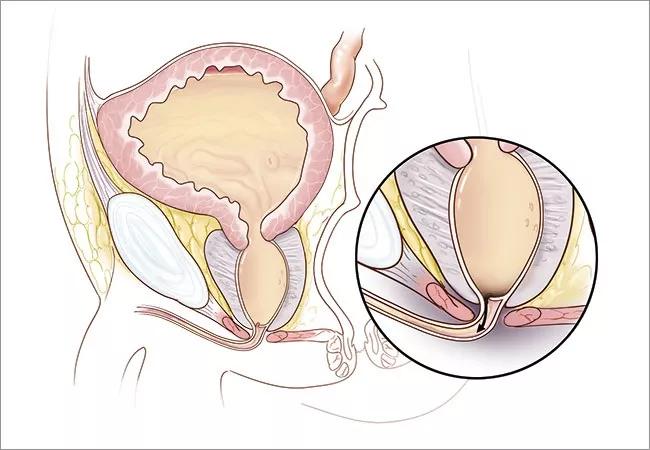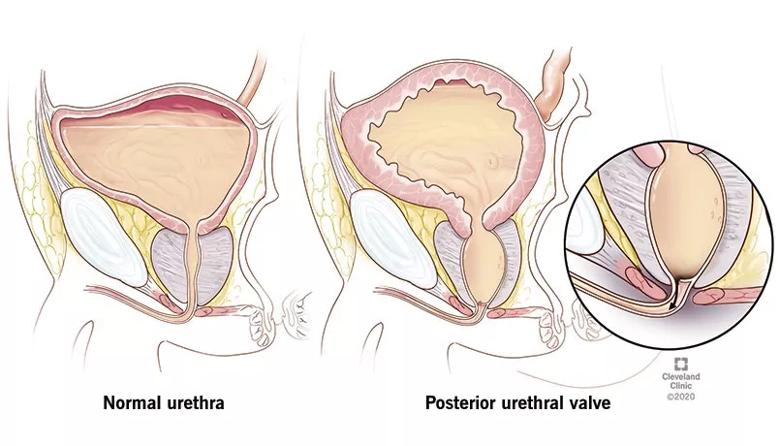A multidisciplinary approach from prenatal to adult

Image content: This image is available to view online.
View image online (https://assets.clevelandclinic.org/transform/8d7a3bb0-1699-4fae-ba00-7ed8f3e18cd8/650x450-Posterior-Urethral-Valve_jpg)
650×450-Posterior-Urethral-Valve
From fetal interventions to adult transplant surgery, treatment for posterior urethral valves (PUVs) requires a multidisciplinary, lifelong approach. At Cleveland Clinic, physicians give particular attention to the transition from pediatric to adult care in these complex patients. The integration of Cleveland Clinic Children’s with the larger healthcare system is critical to the ability to offer patients successful and seamless transitions.
Advertisement
Cleveland Clinic is a non-profit academic medical center. Advertising on our site helps support our mission. We do not endorse non-Cleveland Clinic products or services. Policy
PUVs is a rare birth defect in males in which an abnormal fold of tissue in the posterior urethra blocks urine output. Case severity ranges from mild symptoms to chronic kidney disease (CKD) and death. For some patients, care begins in utero (Figure).

Image content: This image is available to view online.
View image online (https://assets.clevelandclinic.org/transform/0e77dcca-b239-4cdb-90a0-a992591bf7a3/805x-Posterior-Urethral-Valve_jpg)
Figure. Side-by-side comparison of normal urethra and posterior urethral valve.
“In our practice, the team that evaluates the fetus continues to work with the patient throughout the lifespan,” says Katherine Dell, MD, Vice Chair of Research at Cleveland Clinic Children’s and pediatric nephrologist. “Our maternal-fetal medicine specialists can offer amniotic shunting and bladder aspirations, which may protect lung development and prevent pulmonary hypoplasia. Then, the mother delivers in our special delivery unit, and both pediatric nephrology and pediatric urology provide specialized care for baby after birth. That kind of attention continues into adulthood.”
About 15% of children with PUV progress to CKD. For these children, a multidisciplinary approach is even more critical. “Our urologists are also our transplant surgeons, which is unique and only the case at a few other institutions in the country,” says Audrey Rhee, MD, pediatric urologist at Cleveland Clinic. “Because these are urologists who specialize in transplant, they have a unique depth of understanding of PUV and work closely with nephrology as well.”
Once patients receive a transplant, continued follow-up occurs with their pediatric nephrologist and urologist, and a coordinated care team ensures support services are utilized.
Advertisement
When patients age out of pediatric care, they are transitioned to adult care with Cleveland Clinic specialists. The pediatric kidney transplant team, including a dedicated renal social worker, begins working with children and families early in adolescence to prepare them for eventual transition. Over time, formal transition readiness is assessed.
“The transfer to the adult kidney transplant team is fairly seamless,” says Dr. Dell. “We have identified specific adult specialists who work with us on these transitions, and we communicate with them during the transition period. Because we are in one health system, all of the patient’s records, which may be extensive, are readily available to the adult providers. This is much harder to accomplish at a freestanding children’s hospital.”
One of the most important aspects of early care is clear communication of prognoses with parents-to-be, says Dr. Dell. The prognosis for PUV can range from no issues, to surgeries to address bladder capacity and emptying, to kidney transplant. And physicians don’t know how to definitively predict where on the spectrum a child might fall.
“Some kids do fine, and then suddenly their disease progresses,” says Dr. Rhee. “We’re currently conducting a retrospective study of Cleveland Clinic patients to look for correlations, but right now there is no algorithm or nomogram for these patients. The team has currently submitted for publication research on adult outcomes, which suggests the importance of closely monitoring these PUV patients into adulthood as their kidneys can still fail later in life.”
Advertisement
Currently, physicians focus on arming parents with information about how they will manage possible outcomes and what they are looking for in follow-up visits. Parents are connected with appropriate support services to manage the uncertainty that comes with this diagnosis. But insights from research and potential treatments are on the horizon.
Novel treatments, such as antifibrotic agents, are being studied in a variety of kidney diseases in adults. Dr. Dell is optimistic that a similar treatment may eventually be available for PUV. However, the variability in the clinical course of PUV patients makes it challenging to design clinical trials. Cleveland Clinic Children’s pediatric nephrology and urology teams will be starting studies aimed at using novel imaging methods to assess kidney disease progression in these patients
“It’s an intriguing disease process that’s very difficult to pin down, says Dr. Dell. “But through our multidisciplinary approach, we offer excellent care and disease management for these patients across the age spectrum, and we hope to one day offer better prognostic tools and treatments for both children and adults.”
Advertisement
Advertisement
Findings hold lessons for future pandemics
One pediatric urologist’s quest to improve the status quo
Overcoming barriers to implementing clinical trials
Interim results of RUBY study also indicate improved physical function and quality of life
Innovative hardware and AI algorithms aim to detect cardiovascular decline sooner
The benefits of this emerging surgical technology
Integrated care model reduces length of stay, improves outpatient pain management
A closer look at the impact on procedures and patient outcomes